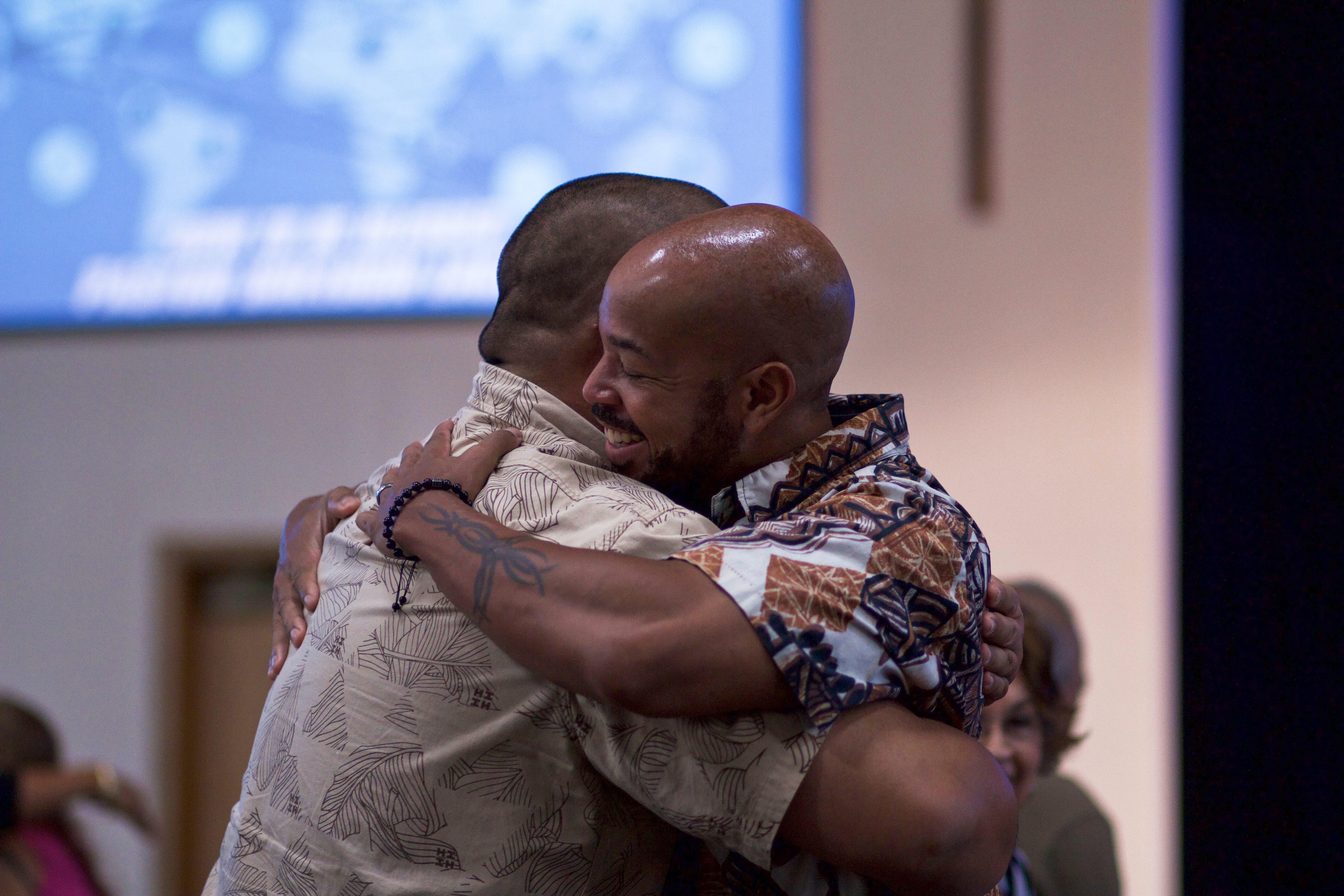Who do mice pray to? Cheesus.
Key Verse: “You will keep in perfect peace him whose mind is steadfast because he trusts in you.” (Isaiah 26 :3)
This wonderful promise was given in the darkest period of Israel’s history, so it may well prove to be a special help to us today, when we are surrounded by much gloom and depression and when we are constantly threatened with the three great enemies of doubt, fear and worry.
When all is going well, and the skies are bright, it is easy to read our key text in a very superficial way; but when clouds of trial, disappointment, fear and alarm drift across our sky and the sun is hidden, then how precious these words become to us!”
There is no promise anywhere in the Bible which encourages us to believe that while we are in our earthly bodies we shall experience freedom from trouble, but there is something far better – there is the promise of peace in the midst of trouble. Of what value would freedom from trouble be if we had no inward peace? Yet how wonderful it is that in the midst of the fiercest battle, and while the storm is at its height, the trusting soul may experience inward peace, a deep-down calm and quiet confidence!
Discussion
- When did you last experience peace?
- If you had to use words to describe it, how would you describe it?
- Have you ever had a season where you couldn’t feel peace? How did it feel?
What is this great blessing God has offerd to us
It is described as “perfect peace”. But what is perfect peace? Can we define it?
Yes, it is a condition of freedom from disturbance within the soul; it is perfect harmony reigning within.
The Hebrew word “shalom” has in it the idea of soundness of health, so that to be filled with perfect peace is to be spiritually healthy and free from all discord within the soul. There can be no room for jealousy, envy, discontent, uncontrolled temper, selfishness, pride or intolerance in the soul which is filled with peace, for all these things are disturbing factors in the heart. They are discordant notes.
The peace which God offers, and which we by His grace may experience, is very practical. It is none other than a great calm which He commands – look up Mark 4:39. God calls the peace which He gives, “perfect peace”. In what sense is it perfect?
- It is perfect in QUALITY; that is to say, it is perfect in the kind of peace it is. There is an imperfect peace, e.g. the peace of Ignorance, when we imagine that all is going well whereas, in fact, if our eyes were open to see the truth we would know that all is not well (Jeremiah 6:14). There is also the imperfect peace of Stagnation; the pool of water may be calm and peaceful, but underneath it is foul and green with slime. Many men and women know only a peace like that, and one day the shock of God’s judgment will stir up their pool and they will find that they have no real peace at all. There is also the imperfect peace of Dependence, which is a peace which is dependent upon some thing or person. How unsatisfactory this is, for the “thing” may fail and the “person” may die! Then, where is their peace? In contrast with these three kinds of imperfect peace, God’s peace is perfect.
- It is perfect in QUANTITY; that is to say, the supply of it is sufficient and it exactly meets our need. The marginal rendering of “perfect peace” is “peace, peace”, i.e.double peace. This is very significant when we turn to Philippians 4:7, for there we are told that this double peace is peace of heart and mind, and that is the kind of peace we need, a peace which garrisons our mind and calms our heart. This double peace is also double in the sense that it is: (i) peace with God (Romans 5:1); and (ii) the peace of God (Philippians 4:7).
- It is perfect in CONSTANCY; that is to say, it is permanent and not intermittent. The promise says, “you will keep…” – compare Psalm 121:4.
The Worlds Peace
The world’s peace is fleeting and changes with circumstances.
During times of prosperity, nations experience temporary peace. But when economies struggle, countries find themselves on the brink of civil war as well as war with their neighbors. The peace of the world is a precarious thing. Conflict erupts when people are hungry; peace disappears when circumstances turn ugly:
Thus says the Lord concerning the prophets who lead my people astray, who cry “Peace” when they have something to eat, but declare war against him who puts nothing into their mouths. (Micah 3:5)
The world’s peace is built on the weak foundation of compromise.
In the Old Testament, God warned the Israelites that if they inter-married for political reasons, they would face the temptation to compromise their love for the one true God and end up serving false gods. This compromise, though it would create a temporary absence of conflict, would ultimately lead to destruction:
Be careful not to make a treaty with the inhabitants of the land that you are going to enter; otherwise, they will become a snare among you. (Exodus 34:12, NIV)
Therefore do not give your daughters to their sons, neither take their daughters for your sons, and never seek their peace or prosperity, that you may be strong and eat the good of the land and leave it for an inheritance to your children forever. (Ezra 9:12)
The world’s peace ignores the root of the problem.
When asked, “What’s wrong with the world today?” many will point to volatile stock markets, corrupt governments, disappearing rainforests, poor diets, lack of healthcare, broken families, overcrowded schools, and more. The world tries to fix these problems by doing good: feeding children, building wells, regulating markets, conserving wildlife, funding charter schools, and thereby achieving a type of peace.
The world’s peace tries to fix the symptoms of sin but fails to see how the root of the problem is the sin-disease itself, something that can only be healed by Christ—not by money, regulation, or reform. Dealing with the symptoms of sin but failing to diagnose the sin itself is not new. In the Old Testament, the false prophets treated sin “lightly” and proclaimed the problem “solved” when it wasn’t:
They have healed the wound of my people lightly, saying, “Peace, peace,” when there is no peace (Jeremiah 6:14).
Precisely because they have misled my people, saying, “Peace,” when there is no peace, and because, when the people build a wall, these prophets smear it with whitewash. (Ezekiel 13:10)
In contrast to the world’s promise of peace, God’s peace is permanent and firmly grounded in his Word. He doesn’t ignore our sin—he heals it, making his peace a different kind of peace from what we find in the world.
Gods Peace
God’s peace is permanent and secure.
When circumstances are free of conflict, we enjoy momentary peace. But when we face difficult relationships, health problems, and financial crisis, the momentary quiet is disrupted and chaos rules the day.
Our God offers peace in the midst of chaos. His peace doesn’t change with the circumstances; it is secure in spite of the circumstances.
“For the mountains may depart and the hills be removed, but my steadfast love shall not depart from you, and my covenant of peace shall not be removed,” says the Lord, who has compassion on you. (Isaiah 54:10)
“I have said these things to you, that in me you may have peace. In the world you will have tribulation. But take heart; I have overcome the world.” (John 16:33)
Do not be anxious about anything, but in everything by prayer and supplication with thanksgiving let your requests be made known to God. And the peace of God, which surpasses all understanding, will guard your hearts and your minds in Christ Jesus. (Philippians 4:6-7)
God’s peace is built on the sure foundation of his Word.
Young or old, male or female, we’ve all experienced the pain of a broken promise. No matter how much our families, friends, and coworkers love us, at some point, someone will disappoint us. And despite our best intentions, we are likely to disappoint someone else by saying one thing and doing another. God’s Word, however, can be trusted. He never contradicts himself or acts in a way that is out of character. He will never disappoint.
Great peace have those who love your law; nothing can make them stumble. (Psalm 119:165)
You keep him in perfect peace whose mind is stayed on you, because he trusts in you. (Isaiah 26:3)
God’s peace is ours because Jesus heals our root of sin.
All religions other than true Christianity have one thing in common: They try to achieve peace with God by doing works and following rules. Christianity is different.
In Christ, we are offered peace with God because we who “once were far off” (Ephesians 2:13) have been reconciled to God through Jesus’ death and resurrection. Jesus’ sacrifice addresses the root of the problem that the world ignores. By his sacrifice, he bridged the gap that sin inserted between us and God. He took the punishment for our sin and, in exchange, he gives us peace with God.
But he was pierced for our transgressions; he was crushed for our iniquities; upon him was the chastisement that brought us peace, and with his wounds we are healed. (Isaiah 53:5)
For he himself is our peace, who has made us both one and has broken down in his flesh the dividing wall of hostility. (Ephesians 2:14)
And the effect of righteousness will be peace, and the result of righteousness, quietness and trust forever. (Isaiah 32:17)
While we experience eternal peace through reconciliation with God in Christ, we also receive the gift of his Holy Spirit. Because of him, we enjoy the blessing of peace in our daily lives—even when we find ourselves in the midst of turmoil.
Discussion
- What other key differences have you found?
- Have you experienced either? How did they feel?
How does this perfect peace come to us?
- By Christ Jesus. Turn to Philippians 4:7 again and notice that the Lord Jesus Christ is the channel through whom the peace of God flows into our souls. This peace within is the possession of the Christian alone. There is no peace for anyone who does not possess Christ and who is not resting on the finished work of Christ for salvation. It is “the blood of Jesus (which) whispers peace within” (Colossians 1:20).
- By the Holy Spirit. The Lord Jesus Christ procured peace for us upon the cross of Calvary, and that peace is offered to us through Him as the channel, but it is conveyed to our hearts and minds by the Holy Spirit -–look up Galatians 5:22. As the Holy Spirit fills and floods our lives, so He produces this wonderful fruit within us.
- By His Word. Look up the great promise which is made in Psalm 119:165. Things and people can so often disturb us, or even cause us to stumble, but here is a promise of perfect peace to those people who love and meditate in and obey the Word of God.
- By our obedience. Look up Leviticus 26:3-6, and be sure to notice that most important word “If”. God guarantees to us that if we will walk in His statutes and keep His commandments, He will keep our hearts in perfect peace; if we will do our part, then God will surely do His part.
- By plenty of praise and prayer. The promise of Philippians 4:7 is preceded by the conditions mentioned in verse 6.
Reflection
- What do we do when we dont feel this peace?
- How do we help other people find this peace?
















